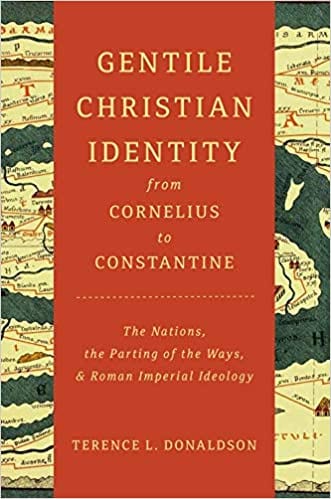Q. How were these various challenges met?
A. In order to address this set of challenges, Christian apologists such as Justin made several moves. One was to claim ethnē as an identity term and to identify themselves with “the nations” that were frequently referred to in Israel’s scriptures. This enabled them to claim a kind of antiquity; as Christ-believing ethnē, they were the ones whom the ancient prophets had foreseen. It also enabled them to position themselves favorably with respect to the Roman empire—to argue that Christ represented a more effective way of drawing “all the nations” into a peaceable, trans-ethnic dominion. In some ways, I see this as a positive move, at least to the extent that it served to connect the proto-orthodox (and now almost completely gentile) church with the non-Jewish characters in Israel’s narrative. Of course, I’m certainly not endorsing the anti-Jewish form in which this move was carried out; i.e., that God has rejected the Jews and replaced them with gentiles. And with Constantine’s patronage of the church and the resultant alignment of the Christian movement with imperial power, this move was fraught with additional danger as far as the Jews were concerned.
But this identification with “the nations” and the argument that the church represented the fulfillment of scriptural expectations still conceded antiquity to the Jews. Here the apologists made another move. This church drawn from all the nations also constituted a nation or people in itself—specifically, the nation that God had promised to Abraham at the beginning. In other words, the gentile church was really and truly Israel, as Justin declares to a skeptical Trypho.
A second aspect of this move was to make a distinction between the pre-Mosaic patriarchs and the people to whom Moses gave the law. Here the law was seen as simply a remedial thing, given by God to counteract the bad idolatrous habits that the people had picked up in Egypt. The patriarchs (sometimes designated as the “Hebrews,” in contrast to the torah-subject “Jews”), together with other Old Testament heroes, were thus, in a sense, Christians before Christ. The upshot for the Jews, then, was that they got bypassed and squeezed out of their own scriptural narrative, and were vilified in the process.
What both moves have in common, I suggest, is a desire on the part of the gentile church to claim the centre—to present themselves with respect to the Roman world as an empire-like entity, a counter-empire; and to position themselves at the centre of Israel’s scripture by laying claim to the identity of Israel itself. While one can understand both moves as responses to the exigencies of the apologetic situation, in light of the way history unfolded it seems to me that they represent points at which, with different choices, things “could have been different.”












